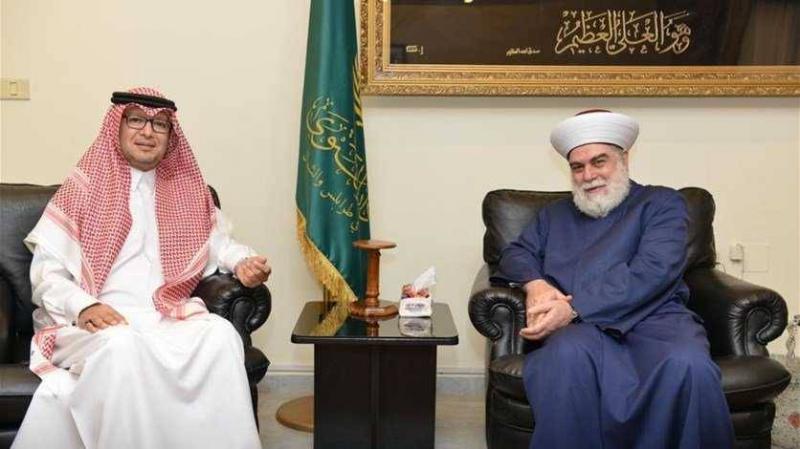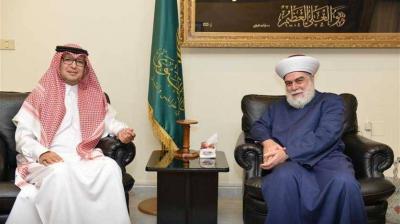Saudi Ambassador Walid Bukhari toured Tripoli today. In this context, he visited Major General Ashraf Rifi, who stated, "We are always hand in hand with Saudi Arabia." Additionally, the Mufti of Tripoli and the North, Sheikh Muhammad Imam, welcomed Ambassador Bukhari at the Dar Al-Fatwa in Tripoli. During the meeting, friendly conversations were exchanged, and the latest developments on the Lebanese scene were discussed, along with issues concerning the city of Tripoli. Ambassador Bukhari was also hosted by the head of the "Karamah Movement," Faisal Karamy, at Al-Madina University in Tripoli, in the presence of a crowd of politicians, unionists, doctors, lawyers, academics, and media figures.
Bukhari toured the university and learned about its buildings and projects. Karamy delivered a speech stating, "It has become customary to welcome guests, but His Excellency the Ambassador, in his city of Tripoli and at Al-Madina University, cannot be considered a guest. At this moment, both he and I are guests of the sister kingdom, which has contributed to the development of this educational institution dedicated to serving the people of Tripoli and the North."
He added, "You know, Your Excellency, as everyone does, that Tripoli possesses a special, unique, and extraordinary affection for the sister kingdom, and the people of Tripoli share historical ties with the kingdom and its leadership for many decades. Fortunately, these feelings are mutual; we are fully aware that Tripoli is present in the minds and hearts of Saudis, and that this mutual affection has always borne good for our city and its people."
He continued, "I take this opportunity to convey my sincere feelings of affection and all thanks and appreciation to His Majesty King Salman bin Abdulaziz Al Saud and His Royal Highness Crown Prince and Prime Minister Mohammed bin Salman, who insisted that the Saudi-French assistance fund for Lebanon include Tripoli and the North. This generous initiative is greatly valued, and we see it as a continuation and affirmation of His Royal Highness's, the kingdom's, and the Saudi leadership's interest in Lebanon generally and Tripoli and the North specifically. Whenever we remember something good, we find the name of the Kingdom of Saudi Arabia, starting from this place where Al-Madina University proudly houses the building of the late King Abdullah bin Abdulaziz Al Saud, which is part of many contributions the kingdom has made to this university, as well as many contributions and projects in Tripoli or throughout Lebanon, culminating in the essential historical role the Kingdom of Saudi Arabia played in ending the Lebanese civil war and establishing the new national living charter through the Taif Agreement."
He added, "This is also an opportunity to thank the kingdom again for its commitment to upholding the Taif Agreement and for emphasizing the necessity of applying the Taif Agreement, especially what was included in the Saudi-French statement regarding Lebanon and the application of the constitution and the Taif Agreement and the election of a president within constitutional deadlines. These matters reflect the kingdom's interest in the stability and safety of Lebanon. The title of the deterioration occurring in Lebanon can be summarized by the reluctance and caution of fraternal and friendly countries and donor institutions in dealing with the corrupt system that has led our country to this low point. I do not wish to absolve the Lebanese of their unprecedented transgressions in the history of nations; however, sadly, it is a method that has controlled power and the country's resources, confronted by another approach. We, who built the institutions and established the rule of law, are the ones who laid the foundations of integrity, preserved public funds, fought against corruption and corruptors, and achieved a stable and prosperous economic situation in Lebanon that everyone witnessed before the situation and concepts changed, and before the method of looting and wasting and prioritizing personal interests over the state's interests took hold. We look forward to the support and assistance of the Kingdom of Saudi Arabia in restoring integrity in Lebanon."
He continued, "The Arab option in Lebanon is the only choice because, simply put, it means the revival and salvation of Lebanon. It is aligned with historical, geographical, strategic, and fraternal facts that make Lebanon an integral part of its Arab surroundings and its Arab issues and concerns. Lebanon's commitment to the best relations with friendly countries, all friendly countries without exception, does not mean in any way that it could form a distance from the Arab option and Arabism and the essential and key leaderships and countries that represent Arabism in this region, among which, of course, leading is the Kingdom of Saudi Arabia."
He said, "I once again turn to my dear friend Ambassador Walid Bukhari to say that Lebanon looks today to an active and essential role for the Kingdom of Saudi Arabia to restore its economic, social, political, and constitutional stability, and I affirm to him that the kingdom's role is central and essential even in the internal Lebanese balances, and this is not hidden from anyone. We are optimistic that tomorrow will bring better days for our country, relying on our brothers and friends in the world, foremost among them the Kingdom of Saudi Arabia."
Karamy concluded, "Your Excellency, I can only say in closing that this is your city and your university, and God willing, we will succeed together for the good of Lebanon and for the good of the sister kingdom."
Bukhari spoke, saying, "First, allow me to thank you for the warm welcome, which is not strange for you, and I thank you for these heartfelt words. The ties that bind us to you and to the beloved city of Tripoli, the capital of the North, are historic and 'the heart is in the North.'"
He added, "There are deep relationships connecting us, not only between Lebanon and Saudi Arabia as two countries, but also between the Lebanese and Saudi peoples in terms of kinship, lineage, and alliances. This is not a product of the moment but of years of brotherly relations."
He concluded, "Finally, I thank Al-Madina University and its patron Minister Faisal Karamy, a scion of the esteemed Karamy family, and I thank everyone for their warm reception."
At the end of the visit, the ambassador joined the attendees for a breakfast banquet.




